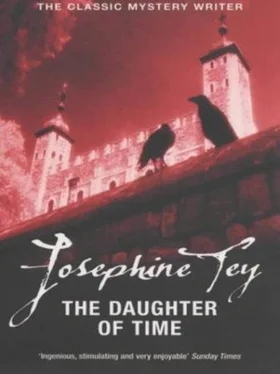There was, too, in the family, a boy whose existence Grant had not suspected. It appeared that the delicate child at Middleham was not Richard’s only son. He had a love-child; a boy called John. John of Gloucester. A boy of no importance in rank, but acknowledged and living in the household. It was an age when a bend sinister was accepted without grief. Indeed the Conqueror had made it fashionable. And conquerors from then on had advertised its lack of disadvantage. By way of compensation, perhaps.
Grant made himself a little aide mémoire .
EDWARD: Edward Prince of Wales, Richard Duke of York, Elizabeth, Cicely, Anne, Katherine, Bridget
ELIZABETH: John de la Pole Earl of Lincoln
GEORGE: Edward Earl of Warwick, Margaret Countess of Salisbury
RICHARD John of Gloucester
He copied it out again for young Carradine’s use, wondering how it could ever have occurred to anyone, Richard most of all, that the elimination of Edward’s two boys would have kept him safe from rebellion. The place was what young Carradine would call just lousy with heirs. Swarming with focuses (or was it foci?) for disaffection.
It was brought home to him for the first time not only what a useless thing the murder of the boys would have been, but what a silly thing.
And if there was anything that Richard of Gloucester was not, beyond a shadow of a doubt, it was silly.
He looked up Oliphant to see what Oliphant had to say on this obvious crack in the story.
‘It is strange,’ said Oliphant, ‘that Richard does not seem to have published any version of their deaths.’
It was more than strange: it was incomprehensible.
If Richard had wanted to murder his brother’s sons then he most certainly would have done it expertly. They would have died of a fever, and their bodies would have been exposed to the public gaze as royal bodies habitually were, so that all men would know that they were in fact departed from this life.
No one can say that a man is incapable of murder – after long years on the Embankment Grant knew that only too well – but one can be sure to within one degree of the absolute when a man is incapable of silliness.
Oliphant had no doubts about the murder, nevertheless. Richard according to Oliphant was Richard the Monster. Perhaps when an historian was covering a field as large as the Middle Ages and the Renaissance he had no time to stop and analyse detail. Oliphant accepted the sainted More, even while he paused in flight to wonder at an oddity here and there. Not seeing that the oddities ate away at the very foundations of his theory.
Having Oliphant in his hand, he went on with Oliphant. On through the triumphal progress through England after the coronation. Oxford, Gloucester, Worcester, Warwick. No dissentient voice was recorded on that tour. Only a chorus of blessing and thanksgiving. A rejoicing that good government was to be the order of the day for a lifetime to come. That after all, Edward’s sudden death had not condemned them to years of faction and a new civil struggle over the person of his son.
And yet it was during this triumph, this unanimous acclamation, this universal hosanna, that (according to Oliphant, riding in the pocket of the sainted More) Richard sent Tyrrel back to London to make away with the boys who were doing lessons in the Tower. Between July 7th and 15th. At Warwick. In the very summer of his safety, in the heart of the York country on the borders of Wales, he planned the destruction of two discredited children.
It was a highly unlikely story.
He began to wonder whether historians were possessed of minds any more commonsensical than those Great Minds he had encountered, who had been so credulous.
He must find out without delay why, if Tyrrel did that job in July 1485, he wasn’t brought to book until twenty years afterwards. Where had he been in the meantime?
But Richard’s summer was like an April day. Full of a promise that came to nothing. In the autumn he had to face that Woodville-Lancastrian invasion which Morton had cooked up before leaving these shores himself. The Lancastrian part of the affair did Morton proud: they came with a fleet of French ships and a French army. But the Woodville side could provide nothing better than sporadic little gatherings in widely separated centres: Guildford, Salisbury, Maidstone, Newbury, Exeter, and Brecon. The English wanted no part of Henry Tudor, whom they did not know, nor any part of the Woodvilles, whom they knew only too well. Even the English weather would have none of them. And Dorset’s hopes of seeing his half-sister Elizabeth queen of England as Henry Tudor’s wife were washed away in Severn floods. Henry tried to land in the West, but found Devon and Cornwall up in indignant arms at the idea. He therefore sailed away to France again, to wait for a luckier day. And Dorset went to join the growing crowd of Woodville exiles hanging round the French court.
So Morton’s plan was washed away in autumn rain and English indifference, and Richard could be at peace for a little; but with the spring came a grief that nothing could wash away. The death of his son.
‘The King is said to have shown signs of desperate grief; he was not such an unnatural monster as to be destitute of the feelings of a father,’ said the historian.
Nor of a husband, it seemed. The same marks of suffering were reported of him less than a year later, when Anne died.
And after that there was nothing but the waiting for the renewal of the invasion that had failed; the keeping of England in a state of defence, and the anxiety that that drain on the Exchequer brought him.
He had done what good he could. He had given his name to a model Parliament. He had made peace at last with Scotland and arranged a marriage between his niece and James III’s son. He had tried very hard for a peace with France, but had failed. At the French court was Henry Tudor, and Henry Tudor was France’s white-headed boy. It would be only a matter of time before Henry landed in England, this time with better backing.
Grant suddenly remembered Lady Stanley, that ardent Lancastrian mother of Henry. What part had Lady Stanley had in that autumn invasion that had put paid to Richard’s summer?
He hunted through the solid print until he found it.
Lady Stanley had been found guilty of treasonable correspondence with her son.
But again Richard had proved too lenient for his own good, it seemed. Her estates were forfeit, but they were handed over to her husband. And so was Lady Stanley. For safe keeping. The bitter joke being that Stanley had almost certainly been as knowledgeable about the invasion as his wife.
Truly, the monster was not running according to form.
As Grant was falling asleep a voice said in his mind: ‘If the boys were murdered in July, and the Woodville-Lancastrian invasion took place in October, why didn’t they use the murder of the children as a rallying call?’
The invasion had, of course, been planned before there was any question of murder; it was a full-dress affair of fifteen ships and five thousand mercenaries and must have taken a long time to prepare. But by the time of the rising the rumours of Richard’s infamy must have been widespread if there were any rumours at all. Why had they not gone shouting his crime through England, so that the horror of it brought men flocking to their cause?
‘Cool off, cool off,’ he said to himself when he woke next morning, ‘you’re beginning to be partisan. That’s no way to conduct an investigation.’
So, by way of moral discipline, he became prosecutor.
Supposing that the Butler story was a frame-up. A story concocted with Stillington’s help. Supposing that both Lords and Commons were willing to be hoodwinked in the hope of stable Government to come.
Читать дальше












